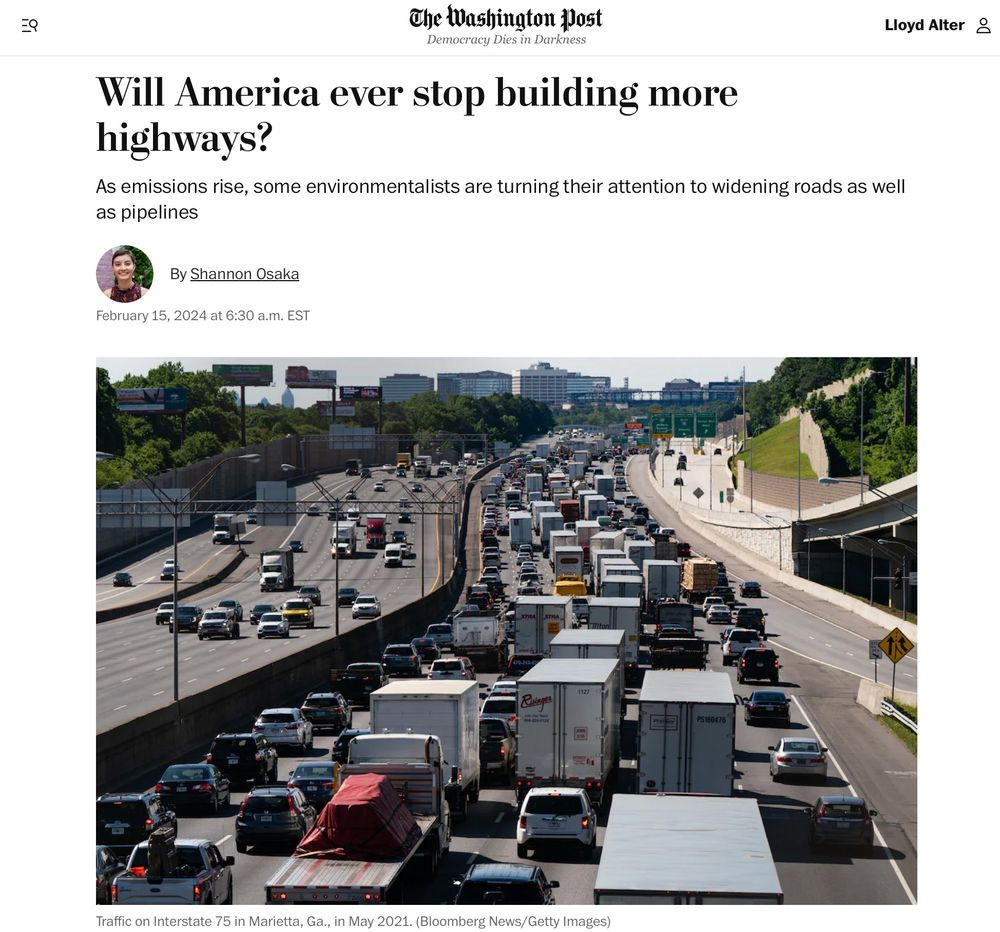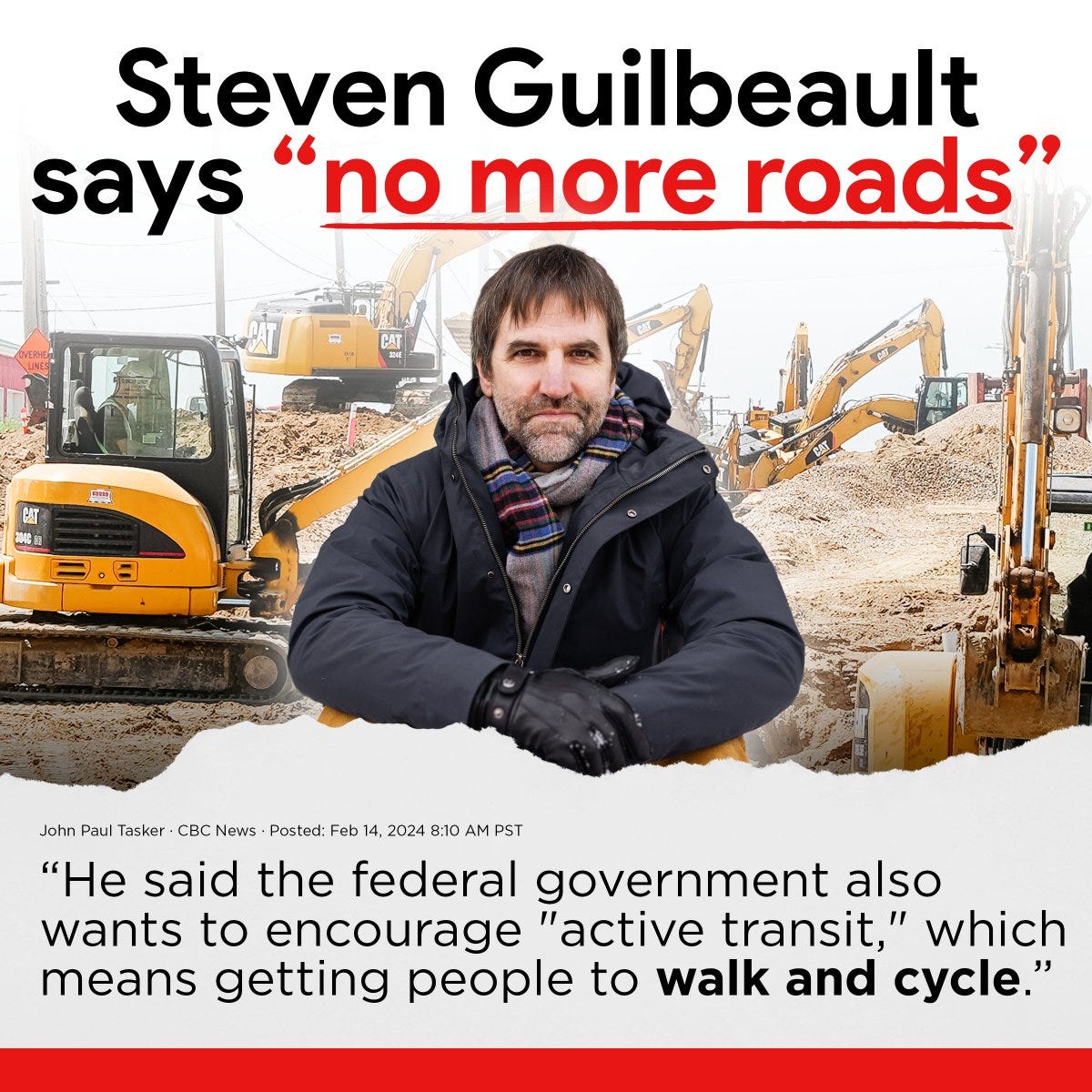The war on cars blows up in Canada again
The Minister of the Environment would rather invest in active transportation and the crowd goes wild.
The leader of the opposition and probable next Canadian Prime Minister, Pierre Poilievre, says, "This prime minister's radical minister of environment is launching a war on cars." As always, Ontario Premier Doug Ford is “gobsmacked.” The entire country appears outraged by a recent speech Environment and Climate Change Minister Steven Guilbeault delivered to a public transportation advocacy group in Montreal.
According to the Montreal Gazette, he noted that electric cars are not a panacea for climate change, calling them "a false utopia that will let us down over the long term." he said all levels of government had to make the hard decision to stop expanding roads.
"Adding more roads and new lanes on existing roads has proven to encourage more car use, which means more congestion, and more calls for road expansion...The analysis we have done is that the network is perfectly adequate to respond to the needs we have. And thanks to a mix of investment in active and public transit, and in territorial planning and densification, we can very well achieve our goals of economic, social and human development without more enlargement of the road network."
And the crowd went wild, right across the country, with some calling Guilbeault an environmental terrorist who should be in jail. (he was arrested in 2001 for climbing the CN Tower). Premiers across the country are attacking him.
No matter that in 2016 eight of the ten provinces agreed to the Pan-Canadian Framework on Clean Growth and Climate Change which called for increased density and "Shifting from higher- to lower-emitting modes of transportation includes things like riding public transit or cycling instead of driving a car, and transporting goods by rail instead of trucks. Improving public transit infrastructure and optimizing freight corridors can help drive these shifts."
Nor is Guilbeault a voice in the wilderness. In the USA, 199 organizations joined together with a statement:
Endless highway expansions are pulling our country into an environmental, budgetary, and public health crisis. It’s time to end this destructive, unsustainable practice and set a responsible course toward a cleaner and more equitable future.
There is nothing new in what Guilbeault is saying, and it makes total sense in a country where tailpipes contribute 22% of carbon emissions.
But the complaints didn't stop there; many, including our rage farmer and conspiracy theorist in chief, the Prime Minister in waiting, Pierre Poilievre, see this as the thin edge of the wedge to degrowth and deindustrialization, a slippery slope to climate tyrrany. (No link to that article here!) This is the real problem that makes dealing with the climate crisis so difficult.
In my upcoming book, The Story of Upfront Carbon from New Society Publishers, I write a bit about degrowth and deindustrialization, and the worry that we can’t keep pouring concrete and pumping oil at the rate that we do. The alternatives are unpalatable to most people, as the world runs on this growth engine. As degrowther Giorgos Kallis writes,
“The politically acceptable is ecologically disastrous while the ecologically necessary is politically impossible.” But you can’t avoid the inconvenient truth: “further growth is not ecologically sustainable.”
Author Dougald Hine watches all the tractors blocking roads around Europe and in his post Helpless Growth quotes the French President Emmanuel Macron, who supposedly told Greta Thunberg: “France is unable to decrease its emissions because of its economic growth.”
“What struck me the first time I heard this was the frankness of the admission. That continued economic growth cannot be reconciled with ecological viability: I’d heard this thought expressed by heterodox economists, climate scientists and anonymous junior officials, but it remained politically unspeakable, a proposition with which no elected leader or candidate hoping for power could associate themselves. So it was startling to learn that it had been spoken aloud by someone in Macron’s position, even behind closed doors.”
This is the impossible box that Steven Guilbeault is in, saying the politically unspeakable out loud- that the world can’t keep endlessly building pipelines, pouring concrete and selling pickup trucks. That there are limits. Hine continues:
“We look out at the world and find it hard to imagine how things can go on like this, yet harder still to see how they could change. What that scene at the Elysée suggests is that this double bind is not a symptom of our relative powerlessness – our inability to get those who hold power to listen – but that the powerful themselves may be as gripped as anyone by the same paralysis of the imagination.”
This is where we are going, where everything we need to do to reduce carbon dioxide emissions is an attack on growth, a radical anti-development agenda. In reality, Justin Trudeau has spent $30 billion on pipelines for the oil and gas industry, is investing billions in mining to establish the battery industry, and certainly hasn’t done anything to slow down the forestry industry. The best we got was a carbon tax, which will be gone in 60 seconds when “axe the tax” Poilievre is elected.
Guilbeault has now walked it all back, suggesting that he was talking about one particular road in Quebec. His office released a statement saying “The federal government has, and will continue to make, investments in roads, infrastructure and highway projects through our various funding programs.”
It’s a shame, because he was right; getting people to walk and cycle is a good thing. He offered a vision of intensification, public transit and active transportation as an alternative to endless sprawl. But while he might be able to sell that at a public transport convention, nobody else wants to hear it.
The unfortunate truth is that the country is divided between the conspiracists like Poilievre and Smith who will do nothing to cut back carbon emissions and everyone else who is suffering from Hine’s paralysis of imagination.
We are losing this fight either way; the only difference appears to be how quickly.









It was both brave and naive of the minister to speak the truth. I knew him as a peer when I was in the NGO world and I greatly admired him then and my respect for him continues to grow. Just an all round decent, deeply informed human pushing the climate conversation where he can while trying not to hand the controls to the populists. Effing discouraging.
"Where we're going, we won't NEED roads..."